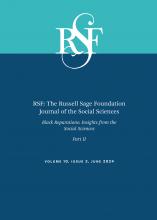Abstract
As a growing number of states and municipalities consider reparative policies for Black Americans, it is important to understand what shapes support for and opposition to these policies. We explore the role that awareness of racial inequality plays in shaping attitudes. Drawing on data from a large, representative survey in Detroit and one national survey, we find that awareness of racial inequality plays a powerful role in the likelihood of supporting reparative policies. Yet, in follow-up surveys, we find that exposing respondents to information on the rationale for and importance of reparations does not shift public support. These findings suggest that it is the awareness of racial inequality that is cultivated over time that appears to be the dominant force in building support for reparations. These findings are particularly important during a time when many school districts are severely restricting access to information about the history of Black Americans.
- © 2024 Russell Sage Foundation. Hudgins, Kamri, Erykah Benson, Sydney Carr, Jasmine Simington, Zoe Walker, Jessica Cruz, Vincent Hutchings, Earl Lewis, Mara Cecilia Ostfeld, and Alford Young Jr. 2024. “Crafting Democratic Futures: Understanding Political Conditions and Racialized Attitudes Toward Black Reparations.” RSF: The Russell Sage Foundation Journal of the Social Sciences 10(3): 49–67. https://doi.org/10.7758/RSF.2024.10.3.03. Direct correspondence to: Kamri Hudgins, at kkanoyh{at}umich.edu, 505 South State Street, Ann Arbor, MI 48109, United States; Earl Lewis, at earlewis{at}umich.edu, 505 South State Street, Ann Arbor, MI 48109, United States.
Open Access Policy: RSF: The Russell Sage Foundation Journal of the Social Sciences is an open access journal. This article is published under a Creative Commons Attribution-NonCommercial-NoDerivs 3.0 Unported License.






